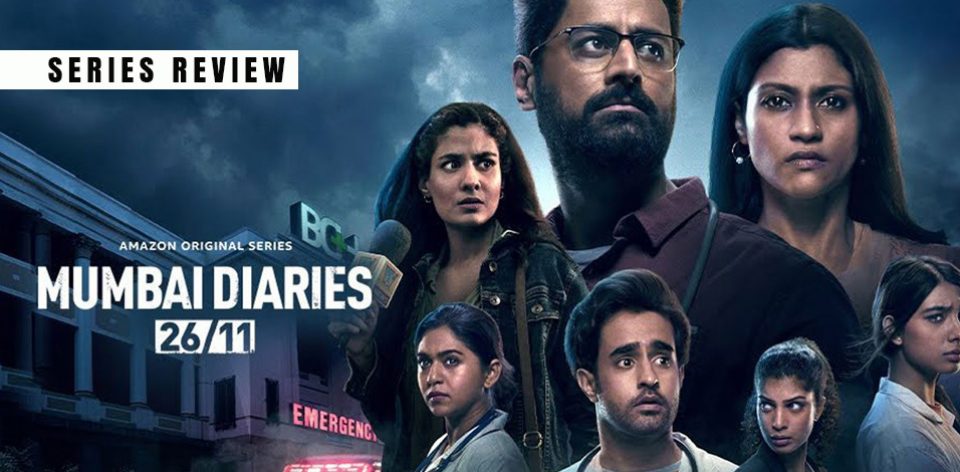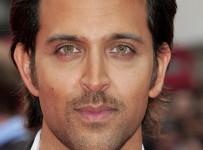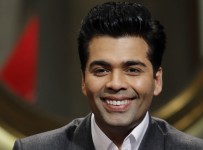For those who don’t know me, I am a hopeless romantic when it comes to watching films and web series. I love watching content, understanding the subtext, and finding meaning in the most mundane aspects of storytelling. It is as if the moving images are always telling me something about life, and as a small kid, I am always trying to grasp the hidden meaning. I felt the same while watching the latest web series Mumbai Diaries 26/11, on Amazon Prime.
Mumbai Diaries 26/11 is an Indian medical drama set in the fictionalized backdrop of the horrific terrorist attack on the fateful night of 26/11, paralyzing not just the city of dreams, Mumbai, but the entire country. The focal point of the web series is Bombay General Hospital, wherein all the casualties from that night were admitted. Dr. Kaushik Oberoi (Mohit Raina) is the hospital’s lead doctor known to bend the rules to save patients’ lives. However, due to his impulsive approach, he often runs into trouble with Mani Subramaniam (Prakash Belawadi), who is the Chief Medical Officer at the same hospital. Accompanying Oberoi is Chitra Das (Konkona Sen Sharma), who serves as the hospital’s social services director, often following her altruistic nature. The web series begins on the morning of the fateful day, wherein three new trainee residents Diya Parekh (Natasha Bharadwaj), Sujata Ajawale (Mrunmayee Deshpande), and Ahaan Mirza (Satyajeet Dubey), join the hospital staff. What follows next is the trauma and turmoil that the frontline workers in Mumbai faced that night while grappling with their own inner demons. The series also has two other strong characters – Mansi Hirani (Shreya Dhanwanthary), a television journalist covering the event of 26/11 with some ethically questionable approach, and Ananya Ghosh (Tina Desai), who leads the evacuation of the Palace hotel.
Mirzapur, Panchayat, Family Man, and now Mumbai Diaries 26/11! Clearly, Amazon Prime has found the template that works for the Indian web series. An ensemble of rich actors and quality production design captured authentically with a tight script!
Mohit Raina has given a stellar performance. He embodies the persona of a trauma surgeon who is used to dealing with life and death situations and is often unfrazzled by strenuous external circumstances. After playing an impactful albeit shorter role in Uri: The Surgical Strike as Major Karan Kashyap, Raina has done a fantastic job in portraying the character of Dr. Oberoi. I sincerely hope this series brings more opportunities for this outstanding actor. Complementing the feisty character of Dr. Oberoi, we have Konkona Sen Sharma playing the role of Chitra Das, a calmer personality. Even though this is Konkana’s first action-oriented sequence after Mr. and Mrs. Iyer, she has played her part beautifully. Now when I think of it, I don’t think I have not liked any of her performances. Speaking of solid performances, I absolutely loved Shreya Dhanwanthary’s performance as an opportunistic journalist who wouldn’t mind putting herself or others in danger to ensure she gets the scoop first. Even though I felt her character transformation could have been written slightly better, full marks for Dhanwanthary for bringing such a modulated performance that enables the audience to empathize with her state of mind through the series without any dramatic sequence of her self-realization. Known for her work in the international arenas (The Best Exotic Marigold Hotel, and Sense8), Tina Desai portrays the role of Ananya Ghosh exceptionally well. Desai leads the evacuation at the Palace hotel, and her portrayal of courage amidst the terror is palpable.
I won’t do justice to this review if I do not give a shout-out to five other actors – Natasha Bharadwaj, Mrunmayee Deshpande, and Satyajeet Dubey. They play the roles of the trainees. As their characters are starting their training as doctors, they each have their own test of fire. Bharadwaj – a rich kid who suffers from depression, Deshpande – a prejudiced girl for being a woman doctor, and Dubey – discriminated against because of his caste. Each of these characters breathes a new essence of their journey and plays their role exceptionally well. Pushkaraj Chirputkar, who plays the role of Samarth Joshi, a healthcare admin worker, does a fantastic job in playing a bigoted character against Muslims. However, Chirputkar’s character isn’t discriminatory from the start. Just like Dhanwanthary, the audience will identify the point at which Chirputkar’s behavior reaches the other end of the spectrum. For me, that was amazing to watch. Lastly, one actor that pleasantly surprised me was Sandesh Kulkarni, who played ACP Mahesh Tawde. It wouldn’t be unfair to say that Kulkarni leaves a lasting impression on the audience when the series ends.
Coming to the technicians, Nikkhil Advani and Nikhil Gonsalves deserve credit for creating such a gripping fictionalized tale that each episode will force the audience to be at the edge of their seats. Vijay Ghodke’s art direction coupled with Priya Suhas’ production design translates the entire series to a realistic look and feel. This look and feel have been captured beautifully by Kaushal Shah. The principal strength of this series is long tracking shots while the characters are moving from one location to another, ensuring that the audiences can feel the tension that characters are feeling on screen. One such short is an 8.5-minute long action sequence, and you can’t stop marveling at the choreography of each character on screen.
This series has communalism, casteism, sexual discrimination, mental health disorder, cut-throat competition, red-tape bureaucracy, and many other aspects in the backdrop of the terrorist attack. Personally, I felt there were a few aspects that weren’t as fleshed out as others. One such aspect was Konkana’s backstory that I found a little unclear. It was only after reading about the character that I understood her backstory.
For the same reason, I am not a fan of the title ‘Mumbai Dairies 26/11’. This is because the series is about the characters and their journey amidst the backdrop of the terror attack – not the terror attack itself… Imagine if ‘Grey’s Anatomy’ was called ‘Seattle Massacre’ or something similar of sorts.
Having said that, the series has done a phenomenal job when it comes to authenticity. Right from casting an all Marathi speaking police force to resemble the dialect and body language of the cops who were Mahastrians, to shooting the arrival of the National Security Guard at precisely 6:05 am as it were on the morning of the terror attack, and to even transcribing the real walkie talkie conversation that occurred between the terrorists on 26/11 – it is clear that the creators have spent time to ensure all those aspects were carefully curated.
Apart from the above, I really appreciated how the series showcased that this was a war between the terrorist and a country and did not label the neighboring country as evil just because the terrorists were hiding there.
Lastly, I found it serendipitous that, as someone who lived in Mumbai on 26/11, I witnessed the show from my home overlooking the World Trade Center on the 20th anniversary of 09/11. It made me realize the commonality that 26/11 has to do with 09/11. Yes, we lost multiple lives on the those fateful days. Both events would forever be marked as the darkest days in the countries’ respective history. However, the significant commonality between the two dates is the resilience shown by people after the gruesome attacks. The first responders and the common people found the courage to work night and day to ensure that the countries’ balance was restored. Even though the lives lost can never be brought back, the human spirit triumphed over the attacks on both occasions.
Reviewed by Puneet Ruparel






